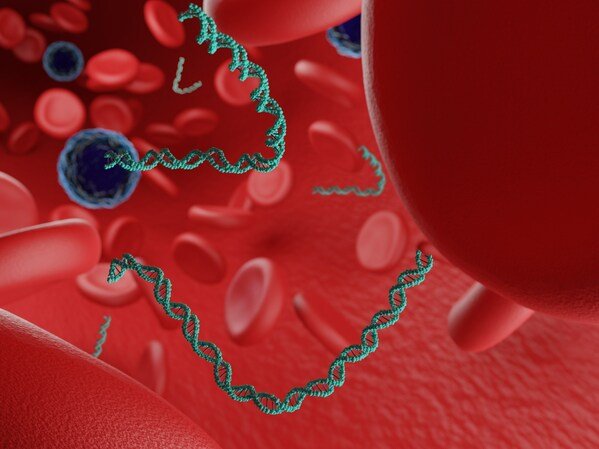Gene Solutions' multi-cancer early detection shows promise in Southeast Asia's biotech industry.
26 April 2023 | Wednesday | News

Image 1. Illustration of cell-free DNA in the blood stream (Shutterstock)
Circulating tumor DNA, or cell-free tumor DNA (ctDNA) assay is based on detecting the appearance of ctDNA in blood. This method is sometimes called Liquid Biopsy as it only requires blood sample collection, rather than tumor tissues. Theoretically, all cells release their cell-free DNA in the blood stream, including tumor cells. The characterization and sequencing ability to detect these ctDNA have been applied into multiple purposes including profiling tumor mutations, monitoring treatment responses, especially early cancer detection for asymptomatic individuals.
There are several assays of liquid-biopsy-based early cancer screening worldwide. However, each uses different signatures on ctDNA. Overall, these tests can simultaneously detect multiple cancer types (from 8 to 50), showing specificity above 95% while sensitivity varies from 44% to 98% depending on cancer types and disease stages. However, none of these studies was designed for Southeast Asia landscape.
Founded in Vietnam, Gene Solutions developed a multimodal liquid biopsy based assay named Screening for the Presence Of Tumor by Methylation And Size (SPOT-MAS) to detect the five most common cancer types (liver, breast, colorectal, gastric, and lung cancer).
In April 2022, the first analytical validation of SPOT-MAS test was conducted on a cohort of 285 patients and 222 healthy individuals. This proved SPOT-MAS' ability to detect cancer patients with a sensitivity of 73.9% and a specificity of 95.9%. (**)
Later, a second clinical validation study was conducted to assess the feasibility and performance of SPOT-MAS in a multi-center clinical trial setting. Gene Solutions launched a prospective cohort study named K-DETEK at 13 major hospitals and one research institute in Vietnam.
The interim analysis of 2,795 eligible asymptomatic participants (6 months from initiation) showed the feasibility of SPOT-MAS for testing samples collected from multiple clinical sites and proved its ability to detect cancer in healthy participants at early stages. The report detected 13 cases (0.47%) with ctDNA signal and demonstrates a positive predictive value of 60%, with 83.3% accuracy in detecting tumor location.
The researchers also presented a notable case report to support further using SPOT-MAS as a complementary method to detect cancer and provide the opportunity for early treatment. The patient had no warning symptoms of cancer, no history of cancer, and no family history related to cancer. He voluntarily joined the study in June 2022 and took the SPOT-MAS test. One month later, his report showed that "ctDNA signal is detected," predicting the possibility of ctDNA from liver cancer (75%) and/or colorectal cancer (23%). He was immediately informed and underwent diagnostic tests for liver cancer within a month. The ultrasound revealed a tumor at the lower segment of the liver, suggesting Stage IB hepatocellular carcinoma (HCC). After these results were carefully reviewed and discussed, the patient was transferred to an oncologist for minimally invasive treatment by a combination of TACE and RFA, a non-surgical optimized method with good efficacy and safety suitable only for patients with early-stage tumors. After receiving treatment, he was scheduled for a follow-up at 12 months from the study baseline.
The performance of SPOT-MAS demonstrated in this study enables the research group to be optimistic that within the next 5 years, SPOT-MAS will be available in clinical practices and implemented in screening programs across multiple nations – alongside other routine screening tests.
As Gene Solutions is expanding to Thailand, Indonesia and the Philippines, it is expected that the firm will open more ctDNA clinical validation in each country to further demonstrate the performance of SPOT-MAS and open new personalized screening method in the fight against cancer.
Most Read
- How Does GLP-1 Work?
- Innovations In Magnetic Resonance Imaging Introduced By United Imaging
- Management of Relapsed/Refractory Multiple Myeloma
- 2025 Drug Approvals, Decoded: What Every Biopharma Leader Needs to Know
- BioPharma Manufacturing Resilience: Lessons From Capacity Expansion and Supply Chain Resets from 2025
- APAC Biopharma Review 2025: Innovation, Investment, and Influence on the Global Stage
- Top 25 Biotech Innovations Redefining Health And Planet In 2025
- The New AI Gold Rush: Western Pharma’s Billion-Dollar Bet on Chinese Biotech
- Single-Use Systems Are Rewiring Biopharma Manufacturing
- The State of Biotech and Life Science Jobs in Asia Pacific – 2025
- Asia-Pacific Leads the Charge: Latest Global BioSupplier Technologies of 2025
- Invisible Threats, Visible Risks: How the Nitrosamine Crisis Reshaped Asia’s Pharmaceutical Quality Landscape
Bio Jobs
- Sanofi Turns The Page As Belén Garijo Steps In And Paul Hudson Steps Out
- Global Survey Reveals Nearly 40% of Employees Facing Fertility Challenges Consider Leaving Their Jobs
- BioMed X and AbbVie Begin Global Search for Bold Neuroscience Talent To Decode the Biology of Anhedonia
- Thermo Fisher Expands Bengaluru R&D Centre to Advance Antibody Innovation and Strengthen India’s Life Sciences Ecosystem
- Accord Plasma (Intas Group) Acquires Prothya Biosolutions to Expand Global Plasma Capabilities
- ACG Announces $200 Million Investment to Establish First U.S. Capsule Manufacturing Facility in Atlanta
- AstraZeneca Invests $4.5 Billion to Build Advanced Manufacturing Facility in Virginia, Expanding U.S. Medicine Production
News












